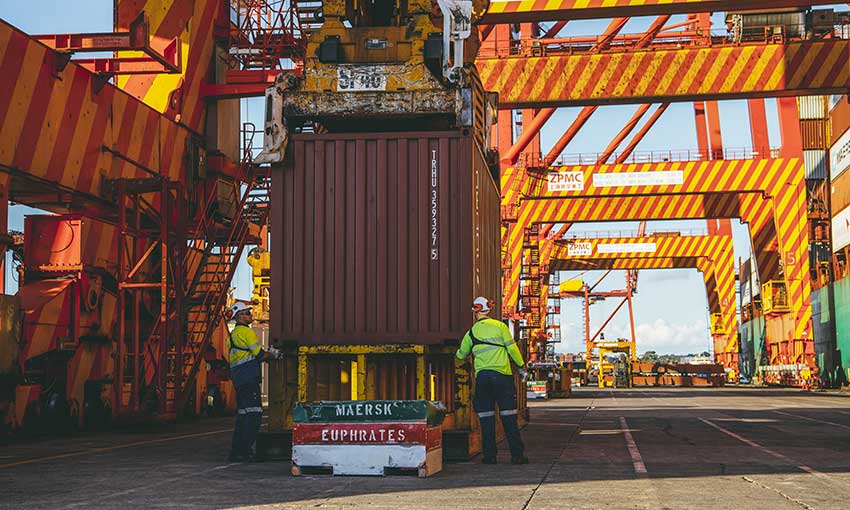THE Australian Competition and Consumer Commission’s annual Container Stevedoring Monitoring Report revealed a sometimes-scathing analysis of the container supply chain in Australia.
The report acknowledged many of the issues plaguing the supply chain are global in scale and cannot be solved on our shores.
However, the report said further problems in the Australian container shipping system urgently need to be addressed, including port productivity, workplace relations and other supply-chain inefficiencies.
The ACCC in its report said systemic industrial relations issues and restrictive work practices are disrupting the supply chain, leading to more congestion and more delays.
In response to the report, Maritime Union of Australia national secretary Paddy Crumlin said the ACCC’s comments about industrial action on the waterfront were an “unhelpful and inaccurate intervention into a lawful bargaining process that has been underway for almost two years” with Patrick Terminals.
“The ACCC should not recklessly conflate the astronomical international shipping costs, port congestion and COVID-19 related pressures on Australia’s supply chains with waterside workers seeking fair pay, job security and safety at work,” Mr Crumlin said.
“Patrick Terminals, like all major players in the Australian shipping industry, have been the beneficiary of a massive surge in international shipping movements and the recent shift to household consumption of imported goods rather than services or tourism during the COVID-19 pandemic. This is not an industry or a business in distress or crippled by industrial action.”
Mr Crumlin said the ACCC’s role is to examine the regulatory and economic circumstances affecting Australian shipping, and not to comment on the “lawful right of workers to negotiate their employment agreements”.
“The ACCC’s union bashing is unhelpful and unwarranted when in fact it is the impacts of COVID-19 and entrenched shipping company cartel behaviours that are affecting Australian consumers’ access to imported goods,” Mr Crumlin said.
In a recent customer update, Patrick Terminals said vessel delays due to industrial action range up to eight days at Sydney, two days at Brisbane, five days at Fremantle and up to nine days at Melbourne.
The Australian Chamber of Commerce and Industry said the ACCC report highlighted that the MUA’s industrial action has “destabilised the operation of Australian stevedores over the past decade”.
ACCI chief executive Andrew McKellar said with the Australian ports system already on the ropes, the MUA’s “opportunistic” industrial action is driving up the cost of business, which will be reflected in higher prices for all Australians.
“Small businesses, their workers and consumers, who have weathered significant losses through lockdowns and restrictions, are now being slugged with increased costs and risks to supply as our ports are held to ransom,” he said.
“The reality is that the MUA is opportunistically ramping up pressure to maintain their grip over port operations, recruiting their family and friends, while they trash any measures for a more flexible and responsive workforce.
Mr McKellar said the MUA’s “chokehold on Australian stevedores” must be stopped.
“If we want to maximise our post-pandemic recovery, ending the inefficiencies of our stevedore operations must be a fundamental priority,” he said.
“With Australian exporters already struggling to meet their contractual obligations, Australian exporters will struggle to compete in overseas markets if we don’t end the strain that industrial action is placing on our ports.”
The ACCC report also identified ongoing operational concerns that have diminished supply chain efficiency.
“The legislative soup of complex regulation, overlapping agency administration and undue red tape governing our ports has curbed their productivity. If our ports aren’t internationally competitive, our post-pandemic recovery is at risk,” Mr McKellar said.
“With over 30 agencies and 200 legislative mechanisms governing the operation of international trade, it is no wonder that we have some of the most sluggish ports in the world. It is vital that federal and state governments reform Australia’s international trade regime to streamline these constraints.”
Mr McKellar also pointed out that port privatisations have produced near monopoly conditions.
“The freight and logistics systems that move goods to and from the ports are similarly constrained. Governments must ensure that a viable system is maintained to ensure Australian exports remain competitive in international markets,” he said.
“It is crucial that Australia is an efficient and attractive place to do business. Reforming our ports and the regulatory systems that constrain them will be instrumental in driving our post-pandemic recovery.”
Meanwhile, Shipping Australia welcomed the publication of the ACCC report; it said it largely validates “everything Shipping Australia has been saying for the last 24 months”.
“We are pleased to see that the ACCC acknowledges that the current supply crisis is really a port-related crisis, especially in the matters of port congestion and industrial relations,” SAL said.
“Australian crane rates are of course extremely important, we have ourselves just produced a thought-leadership analysis on this exact subject, but we are very pleased that the ACCC has in the current edition of the report expanded its scope beyond crane rates and into overall port productivity.”
Shipping Australia also said it was pleased that the commission has noted the World Bank/I.H.S. Markit report on comparable port performance.
“This extremely important report did, for the first time, throw a clear and shining light on the murky world of port performance,” Shipping Australia said.
“It is time for those who are responsible for port governance both to take notice – and to act to improve.”
Shipping Australia noted that the report shines a spotlight on waterfront industrial relations and how this has hampered the ongoing development of the Australian economy.
“Australia continues to be plagued with industrial relations issues and it is long past time for the federal government to recognise the essential and vital nature of the waterfront and to take steps to ensure that unions cannot take Australia hostage ever again,” the organisation said.





